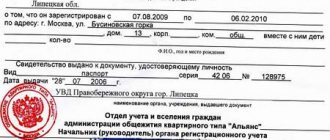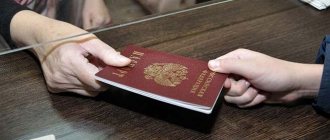Home / Real estate / Housing rights / Registration / Temporary registration at the place of stay
Back
Published: September 26, 2017
Reading time: 6 min
0
500
Temporary registration is limited to a certain period. If it ends and the person leaves, the registration ends automatically. But there are situations when it is necessary to deregister early, to leave the owner of the home with whom he was registered.
- Cases when early termination of temporary registration is required
- How to do it ahead of schedule
- Conclusion
Where to contact
The cancellation of registration ahead of schedule is carried out by authorized government agencies:
- territorial department of the Federal Migration Service at the place of residence;
- Multifunctional Center;
- management company, housing cooperative, another option for service organizations.
The processing time for applications from citizens who intend to deregister ahead of time is established by clause 21 of the Administrative Regulations and is 3 business days.
Cancellation of temporary registration can occur in person, or by remote contact - by regular mail or electronically.
It is convenient to use the services of the MFC, where the reception of requests from citizens is organized according to the “one window” principle. Starting from 2021, employees of a multifunctional center have the right to independently register deregistration by making the necessary notes in their passport (if we are talking about permanent registration). The basis for processing the application will be the papers submitted to the window along with the application. A departure slip is immediately issued.
On the government services website, you can submit an application for deregistration in advance by submitting a completed electronic form via the Internet. The option is available only to registered users.
Service organizations also provide for the possibility of accepting requests regarding the departure of citizens at their place of residence. Such organizations include housing cooperatives, management companies, housing departments, etc. A condition for deregistration is the presence of a passport office (or move-in/check-out department) in the organization.
The choice of the method of application is determined by the peculiarities of the organization of accounting in a particular locality, as well as the desire of the citizens who applied.
Grounds for termination of temporary registration
As mentioned above, temporary registration can be terminated by both the citizen who has the temporary registration and the owner of the residential premises in which such registration was issued.
So, if the initiator is the citizen himself, then most often this happens due to:
- termination of studies by a student of a secondary specialized and higher educational institution , if we are talking about renting housing under a specially concluded agreement or about eviction from a hostel;
- vacation or sanatorium-resort treatment is terminated for any reason , including personal reasons;
- in the case of temporary registration on the basis of being on a business trip, the basis for termination of this type of registration may be a transfer of the place of business trip;
- lack of work at the place of temporary registration , as a result of which a person has to leave this place of residence;
- moving to another place of residence due to necessity or personal desire;
- the actual desire of a particular person to deregister from a particular place of residence.
If we are talking about the owner of the premises, then for him the list of grounds on which he can demand the deregistration of a person is seriously narrowed. In particular, such cases include:
- violation of accepted norms of law by a person who has received temporary registration in the premises, even if such a violation is not confirmed from the point of view of law enforcement officials;
- failure to comply with sanitary standards that are established for a specific type of housing by persons who have received temporary registration in the premises and are living in it;
- existence of debts for utilities , if their payment was included in the terms of the rental agreement for residential premises and the registration agreement in it (if such an agreement was drawn up separately);
- if a registered person does not appear at the place of his temporary registration for a long period and has not notified the owner of the premises about the reasons for such absence, then the owner has the right to demand that such registration be terminated early (however, from the point of view of legislation, there is no definition of what should be considered a long period of time) period of absence);
- own desires of the owner of the premises , for example, due to the need to sell housing through sale or donation.
Each of the listed cases of early termination of temporary registration requires mandatory documentation and confirmation from a legal point of view.
How to deregister a person - step-by-step instructions
So, how can you register a person at his place of residence and is it possible to cancel his registration before the deadline?
You can cancel your temporary registration ahead of time in the following order:
- Contact the registration authority.
- Submit the required package of documents.
- Declare your desire to terminate your registration early.
If the documents are provided in accordance with the requirements and other standards are not violated, the request will be granted.
Where to go for feedback?
Deregistration can be done in several ways:
- When visiting the territorial body of the Ministry of Internal Affairs at your place of stay. This is the easiest way to contact, but not always the most convenient.
- Through MFC. The organization's operating hours have a wide range, and the size of the queues is smaller.
- Online, on the State Services website. Applications are accepted around the clock, but they are processed only during business hours.
- Through passport offices of management organizations.
But it should be borne in mind that all documents are processed exclusively in the territorial bodies of the Ministry of Internal Affairs, therefore intermediary organizations transfer the submitted documents there for consideration.
Documentation
The package of required documents directly depends on who exactly initiates the cancellation of registration. If the cancellation is made at the request of the registered person, then he will need:
- Identity card - passport or birth certificate, if we are talking about a minor (the procedure for registering a minor child at the place of stay is described in detail here).
- Certificate of temporary registration.
- Statement.
The property owner will need to provide the following package of documents:
- Passport.
- Documents for ownership of residential premises.
- Statement.
Consent from the other party is not required, nor is his presence required.
Drawing up an application
An application for termination of temporary registration is drawn up by the registered person in any form. It contains the following information:
- The name of the territorial body to which it is submitted.
- Full name of the applicant.
- The address where he was temporarily registered.
- Deadlines for completed registration – from and until what date.
- Date of early deregistration.
- Applicant's signature and date of submission of documents.
- applications for termination of temporary registration
- applications for termination of temporary registration
When writing an application on behalf of the owner, you should provide the same information, changing only the applicant’s full name.
Deadlines
The law allows three days to remove a registered person from temporary registration. However, when applying to the territorial body of the Ministry of Internal Affairs or the MFC, the procedure is performed immediately on the spot, the applicant does not have to wait. Cancellation of registration is carried out without charging a state fee.
Cancellation of temporary registration
Deletion from temporary registration at the place of stay occurs automatically upon the date specified in the papers. In addition, registration can be terminated at the initiative of the citizen who is registered in the residential premises, as well as the person who is the owner of the housing.
Grounds for termination:
- the registration period has expired;
- departure from hotels, holiday homes, etc.;
- deregistration from temporary registration before the deadline specified in the papers.
Important! If the deregistration does not occur automatically, but the person wishes to terminate his registration and is removed from the register, then the relevant authorities must be notified about this. Employees are required to know from what specific date he does not plan to live at that address. And in case of relocation to another place of residence, he is registered there.
This is very important, since temporary registration, like permanent registration, affects the population’s ability to enroll their children in a particular school, receive a pension at a specific address, etc.
A person deregistered must be discharged from the apartment in accordance with a certain legislative procedure. The owner of the apartment in which the person is registered also has the right to withdraw his written request for temporary registration at the place of residence and expel him from the apartment if there are grounds. When carrying out the procedure forcibly, they must be quite serious.
DELETE//www.youtube.com/watch?v=MojxmU4nJSU
Definition of concepts
A person with temporary registration has the right to be registered at a specific address for a certain period of time. Many people believe that he should live in this apartment. But the law does not stipulate the obligation of the homeowner to provide him with a roof over his head.
You can also obtain temporary registration in family-type dormitories. As a rule, state-owned plants and factories must have them. In this situation, the person will live at the place of registration.
In large cities, temporary registration can be obtained for a certain amount of money. Individuals make money from this, receiving rewards in return.
For temporary registration a number of requirements must be met:
- the owner of the property and everyone living in it must give their consent;
- if the property is in shared ownership, then all its co-owners give permission;
- permission from the cooperative will be required if the resident is not a member;
- permission of the legal entity or organization responsible for the property.
If a client lives in another locality for more than three months without registration, he will need to pay a fine of 2,000 rubles. It may not be charged only if the person is refused temporary registration in writing.
The most common reasons for a negative decision are:
- insufficient number of square meters;
- the property is not suitable for habitation;
- the passport of a Russian citizen is invalid;
- landlord's ban.
Thus, if you plan to move to another locality, you need to think in advance about where to get temporary registration. You need to be very careful, as there are many scammers who will take money for their services, but never prepare the documents.
general information
Does a property owner have the right to evict someone without consent?
Therefore, if the owner of the property decides that the neighborhood is no longer acceptable, and the grounds have developed in his favor, there is nothing strange in the fact that he can carry out the deregistration procedure.
The discharge procedure can occur in different ways. The first and most acceptable for this situation is by agreement with what is prescribed. In this situation, the parties discuss the main points of the procedure and carry it out voluntarily through the passport office, without involving other authorities.
If the registered tenant does not want to deregister voluntarily or you cannot contact him at all, but you will have to carry out actions without obtaining the consent of the other party, that is,
through the courts
Temporary registration of a minor child
Registration documents are submitted by parents of minors along with their documents. The procedure is free for all citizens. The list of documents for temporary registration of children is quite short:
- An application filled out by the legal representative of the minor on the prescribed form.
- A copy of the birth certificate with the reverse side showing the citizenship stamp. If the child permanently resides abroad, then his foreign passport is presented.
- Children over 14 years of age submit a copy of their Russian passport.
Within 3 days, the FMS authorities check all the information provided along with the application, and after that they issue certificates of temporary registration. You can also submit documents remotely (by mail, through the government services portal), but you can obtain certificates only by visiting a FMS office.
If a minor is not yet 14 years old, he can only be registered at the place of permanent or temporary registration of his parent (legal representative). Persons over 14 years of age can register without parents. In this case, the package of documents is expanded with the written consent of the parents of the minor or his other legal representatives for temporary registration at the specified address.
It is important to note that consent from both parents is required for temporary registration . If there is no agreement between the parents on this issue (one is for registration, and the other is against), then the issue is resolved in court, since the ordinary procedure does not provide a general solution for disputes of this kind.
It is also noteworthy that deregistration at the place of permanent registration of a minor is not required . The law does not prohibit having permanent registration at one address, while registering temporarily at a completely different address. The certificate of temporary registration must indicate the period during which it is valid. After its expiration, the minor must be temporarily registered at some other or the same address, or within 7 days leave for the place of his permanent registration.
By law, children must be registered where their parents live, and the consent of the property owner is not required for these actions. This creates certain risks for the property owner .
A typical example of this: a citizen entered into a rental agreement and moved into an apartment with his child. Following this, he carried out temporary registration at this address for himself and for the child. The tenancy agreement has expired, there are no grounds for extending the temporary registration of the employer, but only through the court can the minor be re-registered at the same address. As a result, the owner will not be able to sell or otherwise dispose of his apartment while a child is registered in it, albeit temporarily.
To avoid such disputes, the terms and conditions must be carefully spelled out in the rental agreement. After all, according to the law, if the parents do not have permanent registration anywhere, the child cannot be discharged into the void. In the court of first instance, the owner of the property will most likely be denied the forcible eviction of the child.
A similar situation may arise when a newborn (adopted or taken into custody) child appears to a family that has moved into an apartment. With the arrival of the baby, the parents will temporarily legally register him at their place of residence, and for this they will not even need to obtain the consent of the owner of the home.
Here it is worth explaining each risk in detail, given how different they are:
- Risk of loss of property rights. Does not exist, since temporary registration has absolutely nothing to do with the ownership of real estate, no matter who the temporarily registered person is, no matter what age he is.
- Increase in utility bills. That part of them, which is paid not according to meters, but according to the number of registered persons, will increase in proportion to the number of residents. If the rental agreement does not indicate the obligation of tenants to pay for utilities, then the owner of the property will pay for them.
- Inconsistency between the timing of registration of the minor’s parents and the minor’s own. For example, if the child’s registration period has not yet expired, but the temporary registration period for his parents has expired, then they will be able to legally register with their child again.
- Erroneous registration of a minor, not on a temporary, but on a permanent basis, will not allow him to be later discharged even in court. You will have to sell your home, from which the new owner can remove the minor on the basis of Art. 292 of the Civil Code of the Russian Federation and Article 31 of the Housing Code of the Russian Federation.
To summarize, we can say that registering a minor does not entail any risk for the owner of losing rights to real estate, but it is much more difficult to register a minor than his parents, and sometimes this is only possible in court.
The law provides for mandatory registration at the place of residence. Registration can be permanent or temporary, but it must exist. If it is available, employment is provided, children are enrolled in school or a medical institution, and benefits and subsidies are provided.
ATTENTION! If a citizen moves for a long period (more than 90 days) to another locality, he is obliged to register there, temporarily.
The fact of temporary registration is confirmed by a special certificate; registration is carried out for a certain period; if necessary, it will need to be extended. A certificate of temporary registration is valid if it is presented upon request along with a civil passport.
The law on temporary registration does not limit the places that can act as temporary housing. This can be an ordinary rented apartment or house, as well as hotels, a sanatorium, an institution that provides medical services to a citizen, places of restriction of freedom, and tourist centers.
A citizen can live on the territory of such housing until the expiration of the temporary registration period or for a shorter time. If he moves out or moves ahead of schedule, he must be deregistered. After the expiration of the temporary registration period, it is simply canceled. You need to take care of renewing your registration and approach the Migration Service in a timely manner.
The main document is the law “On the right of citizens of the Russian Federation to movement, choice of place of stay and residence...”. Its article 5 deals with the registration of citizens at the place of residence and the peculiarities of deregistration.
Necessity
The question of temporary registration arises when citizens move temporarily to another locality. But without such a procedure you can live in one city, but at a different address; this is not considered a violation of the law.
Conditions for canceling temporary registration
Before canceling temporary registration, a citizen must write an application. You also need to present a civil passport and a certificate of temporary registration. When canceling the registration of a child under 14 years of age, it is necessary, in addition to the above documents, to provide a birth certificate.
The application is drawn up in any form, but must contain the following information :
- name of the department to which the application is addressed. It is written in the upper right corner of the document;
- last name, first name and patronymic of the applicant, address of his temporary registration;
- information about the exact registration period, indicating the start and end dates of registration;
- the date from which the applicant wishes to be deregistered;
- date of document preparation;
- applicant's signature with transcript.
Users of state or municipal housing stock can temporarily register citizens in their residential premises for a period not exceeding the term of the social tenancy agreement. If the citizen who needs to be registered at the specified address does not occupy the living space under a sublease agreement, but is a temporary resident, registration can only be issued for a period not exceeding six months.
Important! In addition to the above, low-income families will also need to provide documents that confirm family income. Only those families whose income is less than the subsistence level established in the region can count on social benefits.
In addition to federal payments, some payments are also provided at the regional level for pregnant women or women who have already given birth. Local authorities determine the amount, as well as the procedure for processing payments, independently. Including the possibility of obtaining child benefits under temporary registration. All conditions and procedures for registration are fixed in regional regulatory documents. The size of the payment will depend primarily on what opportunities are available in the regional budget.
How to discharge a temporarily registered person
- Log in to the site.
- In the catalog of services, select the item on deregistration of citizens at the place of residence.
- Wait for an invitation to arrive at the relevant authorities with original documents within three days.
- Fill out and submit.
Of course, you can submit an application in standard ways: in person, by contacting the territorial body of the Federal Migration Service or by sending the paper by mail to its address. Currently, housing disputes are very relevant and difficult to deal with. You need to understand that temporary registration does not give you the right to permanent residence in your home.
Legislative basis
All processes and actions related to the termination of temporary registration are regulated by current legislation:
- Law of the Russian Federation “On the right of citizens of the Russian Federation to freedom of movement, choice of place of stay and residence within the Russian Federation”, adopted on January 25, 1993 (No. 5242-1);
- by order of the Ministry of Internal Affairs of the Russian Federation, issued on December 31, 2021 “On approval of the admin. regulations of the Ministry of Internal Affairs of the Russian Federation for the provision of state services for registration of citizens..." (No. 984).
Thus, the process of performing this procedure, as well as its timing, are regulated by the legislative acts listed above.
Is it possible to do temporary registration without permanent registration?
Every resident of the Russian Federation must have permanent (PR) or temporary registration (VR). It is allowed to have both or just one type of registration. According to the law, after deregistration from permanent registration, you must register again within the next 7 days.
When registering a VR, you are required to provide information about the place of your last or current registration.
It is possible to issue a VR even if the citizen does not have a PR. In this case, a departure sheet is provided. This document is issued at the time of deregistration.
If, for certain reasons, there was no previous registration at all, or the person applied after the deadline established by law had passed, he has to pay a fine (Article 18.8 of the Code of Administrative Offenses of the Russian Federation).
To register a VR, you must obtain consent from:
- municipal housing - permission of the tenant and all persons registered there;
- from legal entities that are home owners;
- private housing - permission of the owner;
- If a member of the cooperative does not own an apartment, additional permission from the board of the housing cooperative itself is required.
To consent to the registration of a VR, the owner or responsible person must personally contact the relevant authorities. If it is not possible to come to the branch, you can give written permission, but it must first be certified by a notary.
Some features of VR that you need to know about before applying for it:
- A person with BP has the right to freely and at his own discretion use the living space and permanently reside in the specified place throughout the entire period for which the registration is issued.
- The owner cannot independently discharge a person with BP. This requires the consent of the tenant himself.
- Discharge without the consent of the resident is carried out only through the court. There are situations when the court takes into account the difficult circumstances in which the tenant finds himself and postpones discharge for some time.
- Discuss in advance all the conditions and probabilities of discharge with VR. Lawyers advise not to do VR for a long period, since it will not be possible to reduce it.
- Temporary registration can be extended at any time.
- When registering, the duration of registration is immediately agreed upon.
- After the expiration of the specified period, the VR is automatically canceled.
- If a person leaves the apartment ahead of schedule, he needs to inform the FMS about this in order to be deregistered.
Sources
- Konstantin Ivanovich Bokov Formation and development of customs business and customs legislation in Russia in the 19th – early 20th centuries; Prospect - M., 2010. - 258 p.
- Tolstoy, Yu.K. Civil law. Textbook / ed. A.P. Sergeev, Yu.K. Tolstoy. - M.: Prospekt; 2nd edition, revised. and additional, 1997. - 600 p.
- Popov, L.L. Administrative law / ed. Yu.M. Kozlov, L.L. Popov. - M.: YURIST, 2000. - 728 p.
- Business correspondence. Rules for writing German business letters. - M.: ETS; 2nd edition, revised, 2003. - 240 p.
- Laskina N.V. Lecture notes on trade law of foreign countries; Scientific book - M., 2009. - 401 p.
✅ Legal assistance
Forced eviction of temporary residents from an apartment is a labor-intensive process. The absence of an agreement between the parties obliges the owner to prove the validity of the eviction. What if there is almost no evidence? In addition, the situation may be complicated by deteriorating relationships with tenants.
Contact us for a free consultation through a convenient form on the website or by phone. Our lawyers will help you decide on actions to get rid of temporary tenants. The main difficulties may arise when:
- filing a claim for forced eviction;
- collecting evidence that the owner is right;
- drawing up an application to initiate enforcement proceedings or a complaint against the actions/inactions of bailiffs;
- and also when negotiating with violators.
Our specialists are well versed in housing law.
Lawyers will give up-to-date advice, resolve a controversial situation, and estimate the chances of success. Remember that independent eviction is fraught with aggravation of the situation - errors in the statement of claim, weak arguments, loss of finances, and the risk of beatings. It's better to trust the professionals! Attention!
- Due to frequent changes in legislation, information sometimes becomes outdated faster than we can update it on the website.
- All cases are very individual and depend on many factors. Basic information does not guarantee a solution to your specific problems.
That's why FREE expert consultants work for you around the clock!
- via the form (below), or via online chat
- Call the hotline:
- 8(800)302-39-65
— All residents of the Russian Federation - +7(495)128-69-80
— Moscow and the Region - +7(812)509-13-65
— St. Petersburg and region
- FREE for a lawyer!
By submitting data you agree to the Consent to PD Processing, PD Processing Policy and User Agreement.
Anonymously
Information about you will not be disclosed
Fast
Fill out the form and a lawyer will contact you within 5 minutes
Tell your friends
Rate ( 5 ratings, average: 4.20 out of 5)
Author of the article
Maxim Privalov
Lawyer. 2 years of experience. I specialize in civil disputes in the field of housing and family law.
Author's rating
Articles written
614










